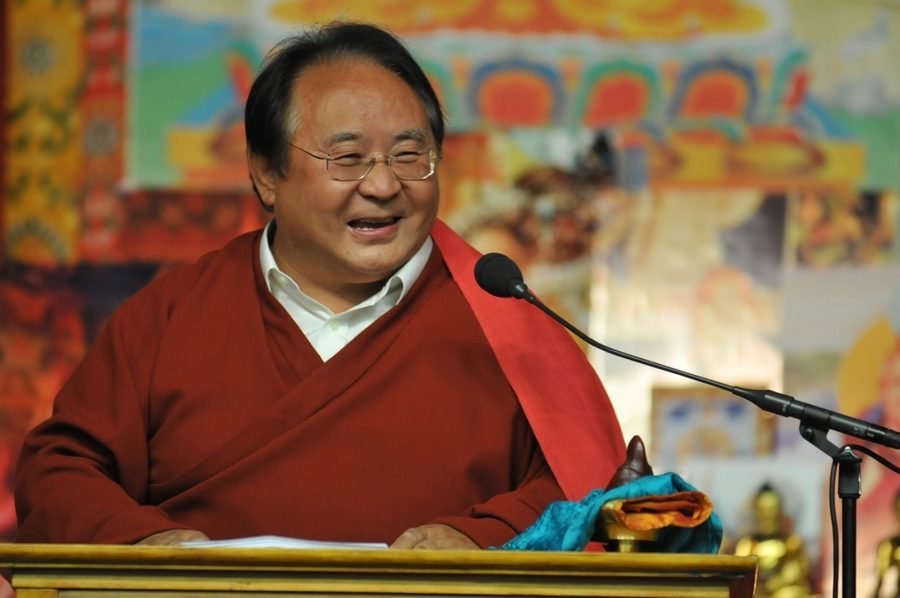
The Black Collar Crime Series relies on public news stories and publicly available information for its content. If any incorrect information is found, please contact Bruce Gerencser. Nothing in this post should be construed as an accusation of guilt. Those accused of crimes are innocent until proven guilty.
Many in the secular community respect and admire the Dalai Lama. I know I did. The Dalai Lama is the fourteenth spiritual leader of the Yellow Hat school of Tibetan Buddhism. Recently, the Dalai Lama was in the news for inappropriately asking a young boy to suck his tongue.
Tibetan spiritual leader the Dalai Lama apologized Monday after a video showing him kissing a child on the lips triggered criticism.
A statement posted on his official website said the 87-year-old leader regretted the incident and wished to “apologize to the boy and his family, as well as his many friends across the world, for the hurt his words may have caused.”
The incident occurred at a public gathering in February at the Tsuglagkhang temple in Dharamsala, where the exiled leader lives. He was taking questions from the audience when the boy asked if he could hug him.
The Dalai Lama invited the boy up toward the platform he was seated on. In the video, he gestured to his cheek, after which the child kissed him before giving him a hug.
The Dalai Lama then asked the boy to kiss him on the lips and stuck out his tongue. “And suck my tongue,” the Dalai Lama can be heard saying as the boy sticks out his own tongue and leans in, prompting laughter from the audience.
While the Dalai Lama quickly apologized, others defended his behavior. One defender blamed China for the Dalai Lama’s behavior being so widely reported in the news. To that, I say, were the reports true? Did the Dalai Lama do what reporters say he did? He quickly apologized, so we know he did it. Sure, China is going to use this to discredit the Dalai Lama. That’s the world we live in.
Another defender suggested that the Dalai Lama was so pure and innocent that he couldn’t have done anything inappropriate. While the Dalai Lama is a humble, peaceful man, he is also shrewd and wise to the things of the world. I doubt that he is “innocent.”
And finally, one defender, Penpa Tsering, the political leader of Tibet’s government-in-exile said, I kid you not:
[The Dalai Lama displayed] “innocent grandfatherly affectionate demeanor.”
“His holiness has always lived in sanctity, (following the life of) a Buddhist monk, including celibacy. His years of spiritual practice have gone beyond sensorial pleasures.
His holiness is now being labeled all kinds of names.”
Grandfatherly behavior? To the grandfathers who read this site, have you ever asked one of your grandchildren to suck your tongue? Of course not.
Tsering saying the Dalai Lama is “beyond sensorial pleasures” is laughable. None of us is beyond sensorial pleasures. I don’t care how spiritual someone might be, he is still a human with all the desires humans have.
Newsweek’s Anushay Hossain had this to say:
We in the West love to romanticize symbols and people from the East. From India’s Mahatma Gandhi to Aung San Suu Kyi of Myanmar to South Africa’s Nelson Mandela to the Dalai Lama. And in most cases, rightfully so. These are incredible humans who have dedicated their lives to liberate their countries, fight for their beliefs, for the rights of their people.
But despite all the glory, respect, and worship we place upon them, it’s important not to do so blindly and to remember that at the end of the day, they are also just people. They are human beings. And the Dalai Lama just gave us all a great lesson in how you can be a revered person, and still be in the wrong.
On Monday, footage of the Dalai Lama kissing a young boy on the lips and then prompting the child to “suck my tongue” during a public event went viral online. The young Indian boy had come forward to pay his respects during a temple event. Some clips garnered more than five million views. The Dalai Lama’s representatives had a swift response to a clip that seemed odd at best, abusive at worst.
“A video clip has been circulating that shows a recent meeting when a young boy asked His Holiness the Dalai Lama if he could give him a hug. His Holiness wishes to apologize to the boy and his family, as well as his many friends across the world, for the hurt his words may have caused. His Holiness often teases people he meets in an innocent and playful way, even in public and before cameras. He regrets the incident.”
….
While it’s great that His Holiness “regrets” asking a child to “suck my tongue,” this “apology” is not only insufficient and offensive but feels more like the Dalai Lama is gaslighting rather than apologizing.
….
But the tricky thing is that when people we respect and revere are accused of predatory behavior they still hold a lot of power. And that influence is something they can and do use to shield them from not only accusations, but any kind of accountability.
….
While some people still prefer to look the other way, or remain in deep denial, when it comes to the possibility that religious and spiritual leaders could be abusing children, history has a very clear pattern. We like to sweep everything under the rug, defend whoever their holiness may be, and act like everything’s fine. Isn’t that what we did and still do when it comes to the Catholic Church and their endless child abuse allegations—including new revelations in Baltimore?
But now it is 2023 and we are more aware of the sexual predators in positions of influence than our parents or even their parents were. We are more open about the need to protect our children and what messages we can give them, so they know how to protect themselves, too.
We are at a pivotal point where we either teach our kids not only about consent, but about how predators are everywhere—even in our religious houses of worship, no matter the faith. Child sexual abuse happens in every religion.
Even if we want to give the Dalai Lama the benefit of the doubt, we can’t. Just watch the video and pay attention to how it makes you feel. It looks wrong and feels wrong because it is wrong. And as a mother of two young girls, I know we must talk to our children regularly about boundaries, consent, and predators.
Because they are everywhere.
Is the Dalai Lama a sexual predator? I don’t know. This could be a one-off, but my gut tells me it is not. The Dalai Lama’s behavior deserves careful scrutiny, but I doubt that will happen. Does this mean he is an evil man? That’s for others to decide, especially the Tibetan people. For me personally, this is a poignant reminder that my heroes have clay feet; that the moment I idealize and glorify someone, it is only a matter of time before I learn that he or she is just as frail and fallible as the rest of us are.
I will frequently receive emails and social media messages from people gushing over my writing. I typically thank such people for their kind words, but then I say to them: trust me, I will disappoint you one day! 🙂 I have had people send me glowing emails about my writing on Evangelical Christianity. Some of them even start donating money via PayPal or Patreon. And then, I write about this or that political issue, revealing my uber-progressive, socialist, pacifistic beliefs. All of a sudden, all their “love” turns into outrage. They cancel their monthly donations and let me know they can’t believe I am a _________ (fill in the blank with any of the numbers of labels I wear). Such is life. I am, who I am. (I lost several readers recently because they don’t like my support of transgender people.)
Years ago, I revered Gandhi and Mother Teresa. Over time, I learned that my idealized view of each of them could not be sustained. In the case of Mother Teresa, thanks to Christopher Hitchens and several other authors, I learned she was a despicable, deceitful human being. Yet, Mother Teresa is still revered by Catholics and others worldwide. I suspect that this will be the case for the Dalai Lama too.
I can’t unwatch the Dalai Lama’s inappropriate behavior with a young Tibetan boy. This is no different from me learning that Independent Fundamentalist Baptist (IFB) megachurch pastor Bob Gray of Jacksonville — one of the best preachers I ever heard preach — was accused of French kissing school girls; that he had been doing so for years. Gray was arrested for his crimes but died before he could be prosecuted. Will the Dalai Lama face investigation and, if warranted, criminal prosecution? I suspect we all know that the answer to that question is no. When societies deify religious figures, it becomes almost impossible to see the figures as fallible (and even criminal) human beings. Think of how many times people have come to this site to defend this or that preacher accused of inappropriate sexual behavior. No amount of evidence will change their minds. To this day, countless Evangelicals believe disgraced IFB preacher Jack Hyles was the greatest preacher since the Apostle Paul. They cannot and will not accept the fact that Hyles was not the man they thought he was. I suspect this will be exactly how many people across the world will continue to treat the Dalai Lama.
How has the Dalai Lama’s recent inappropriate behavior affected your view of the man? Please share your thoughts in the comment section.
Bruce Gerencser, 66, lives in rural Northwest Ohio with his wife of 45 years. He and his wife have six grown children and thirteen grandchildren. Bruce pastored Evangelical churches for twenty-five years in Ohio, Texas, and Michigan. Bruce left the ministry in 2005, and in 2008 he left Christianity. Bruce is now a humanist and an atheist.
Connect with me on social media:
Your comments are welcome and appreciated. All first-time comments are moderated. Please read the commenting rules before commenting.
You can email Bruce via the Contact Form.




 The Black Collar Crime Series relies on public news stories and publicly available information for its content. If any incorrect information is found,
The Black Collar Crime Series relies on public news stories and publicly available information for its content. If any incorrect information is found, 